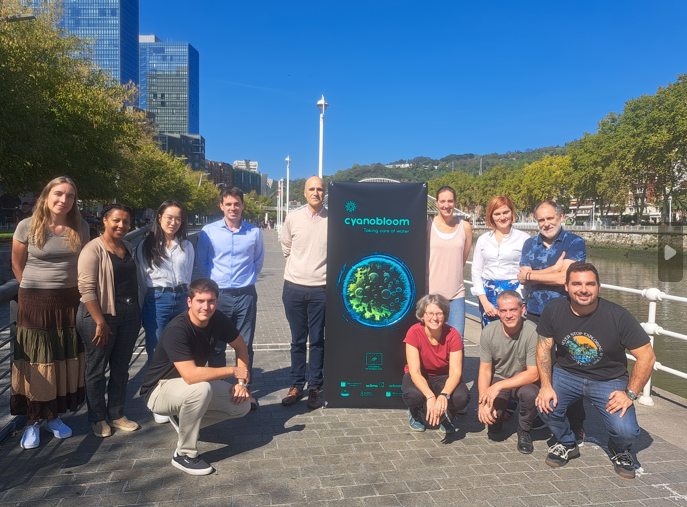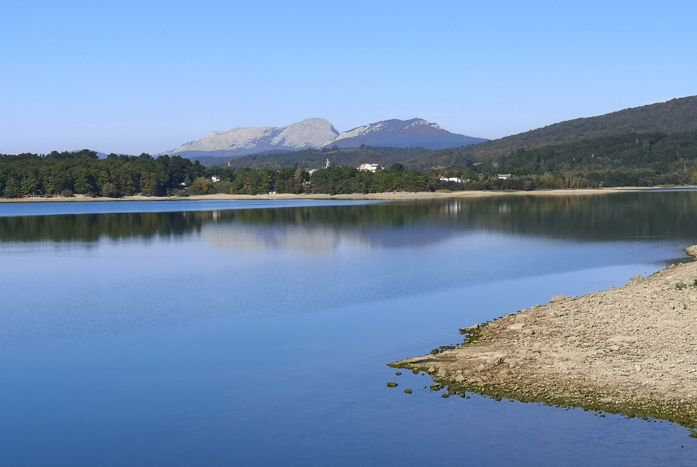Posted: October 10, 2023

The European project LIFE CYANOBLOOM held its launch meeting today at Aclima's offices in Bilbao with the participation of the six international partners that form part of this initiative, which is co-financed by the EU through the LIFE programme and has a budget of just over 2.4 million euros. The Basque company Anbiotek is in charge of coordinating a project that also boasts the participation of Aclima, the Basque Environment Cluster, and four other specialised companies, including Water Insight (Netherlands), Sistemas Genómicos (Spain), Brockmann Consult (Germany) and Brockmann Geomatics (Sweden). Over the next 42 months, the members of this consortium will develop an innovation project that aims to obtain an effective tool for the early and preventive detection of cyanobacterial blooms in reservoirs. These microscopic organisms occur naturally in all types of water, but in warm, nutrient-rich environments (with high levels of phosphorus and nitrogen) they can multiply rapidly, creating blooms that, under the right circumstances, could generate toxins harmful to humans, animals and the natural ecosystem itself. This makes early detection of these blooms the best way to avoid serious water quality problems in these environments. So far, only about 1% of these situations are detected in advance. LIFE CYANOBLOOM aims to design and test an innovative and effective tool that can achieve early detection of up to 90% of these blooms.
Traditional methods of detecting cyanobacterial blooms have been mainly based on the collection of samples in situ and their subsequent laboratory analysis. This systematic approach delays results and makes it difficult to act quickly to tackle the problem. LIFE CYANOBLOOM will design and test an innovative and effective system consisting of a comprehensive risk management tool for the early identification of harmful algal blooms in water supply reservoirs. This tool will combine the usual in situ measurements as well as advanced in-situ measurement techniques with remote monitoring using data from public and private satellites. This will provide an efficient mechanism for securing the water supply ensuring the highest safety standards, with up to 90% improvement in the detection of blooms and a 10-20% reduction in the bloom of toxic cyanobacteria. The solution will support water management authorities by enabling them to design more effective actions to counteract these incidents which can affect public health and may become more frequent in Europe due to rising temperatures caused by climate change.
Testing in European reservoirs
The solution emerging from LIFE CYANOBLOOM will be tested to measure its degree of effectiveness in 4 European reservoirs: the Södra (Sweden) and Westeinderplassen (Netherlands) lakes, the Bellús reservoir in Valencia and the Urrunaga reservoir in Álava (both in Spain). The first of these is located in the central region of Växjö and has eutrophication problems in the form of mass blue-green algal blooms. The stretch of water in the Netherlands is used for commercial shipping, but also for recreation such as sailing or bathing, and often suffers from blooms of the toxic cyanobacterium Microcystis. After appearance of a bloom the beach area is often closed the remainder of the season. The Bellús reservoir is known for its water quality problems due to discharge from industrial areas. Its main use is for irrigation and flood prevention. Finally, the reservoir in Álava is the second largest in the Basque Country, being used for water supply. During the summer, the concentration of chlorophyll increases significantly due to seasonality, as water temperature increases so does algal abundance. The latter two reservoirs are monitored according to the requirements of the surveillance plans established by the Hydrographic Confederations through the corresponding hydrological plans to determine the quality of their water, which seems to be insufficient to assess potential harmful events, so the solution to be developed by this European project could be of great interest. Four natural spaces and four different circumstances that will help test the tool under different conditions.
LIFE CYANOBLOOM aims to increase the number of monitored water reserves by a factor of 10, reduce water supply cuts due to toxic blooms by 10%, reduce exposure time to toxic blooms by 80% and reduce health problems due to poor water quality with the help of early warning by up to 90%. In fact, it is estimated that each case of infection avoided will save the health system around 15,000 euros. Finally, economic losses associated with activities such as fish farming, tourism or leisure will also be reduced.
Bilbao, 5-6 October 2023

We visited one of the reservoirs that will serve as test case for the CYANOBLOOM monitoring service